📚 node [[winners take all]]
- Author:: [[Anand Giridharadas]]
- Full Title:: Winners Take All
- Category:: [[books]]

-
Highlights first synced by [[readwise]] [[September 2nd, 2020]]
- the share of young people who own a business has fallen by two-thirds since the 1980s. (Location 77)
- the average pretax income of the top tenth of Americans has doubled since 1980, that of the top 1 percent has more than tripled, and that of the top 0.001 percent has risen more than sevenfold—even as the average pretax income of the bottom half of Americans has stayed almost precisely the same. (Location 83)
- Those raised near the top of the income ladder now have a 70 percent chance of realizing the dream. Meanwhile, those close to the bottom, more in need of elevation, have a 35 percent chance of climbing above their parents’ station. (Location 90)
- Rich American men, who tend to live longer than the average citizens of any other country, now live fifteen years longer than poor American men, (Location 92)
- There is no denying that today’s elite may be among the more socially concerned elites in history. But it is also, by the cold logic of numbers, among the more predatory in history. (Location 132)
- “If we want things to stay as they are, things will have to change.” (Location 164)
- We must ask ourselves why we have so easily lost faith in the engines of progress that got us where we are today—in the democratic efforts to outlaw slavery, end child labor, limit the workday, keep drugs safe, protect collective bargaining, create public schools, battle the [[Great Depression]], electrify rural America, weave a nation together by road, pursue a Great Society free of poverty, extend civil and political rights to women and African Americans and other minorities, and give our fellow citizens health, security, and dignity in old age. (Location 190)
- the top 10 percent of earners, would be making more than twice as much before taxes as a similarly situated person in 1980. If Cohen entered the top 1 percent of earners, her income would be more than triple what a 1 percenter earned in her parents’ day—an average of $1.3 million a year for that elite group versus $428,000 in 1980, adjusted for inflation. On the narrow chance that she entered the top 0.001 percent, her income would be more than seven times higher than in 1980, with a cohort average of $122 million. The study included the striking fact that the bottom half of Americans had over this same span seen their average pretax income rise from $16,000 to $16,200. One hundred seventeen million people had, in other words, been “completely shut off from economic growth since the 1970s,” (Location 269)
- That ideology is often called neoliberalism, and it is, in the framing of the anthropologist David Harvey, “a theory of political economic practices that proposes that human well-being can best be advanced by liberating individual entrepreneurial freedoms and skills within an institutional framework characterized by strong private property rights, free markets, and free trade.” (Location 302)
📖 stoas
- public document at doc.anagora.org/winners-take-all
- video call at meet.jit.si/winners-take-all
⥱ context
← back
(none)
(none)
↑ pushing here
(none)
(none)
↓ pulling this
(none)
(none)
🔎 full text search for 'winners take all'